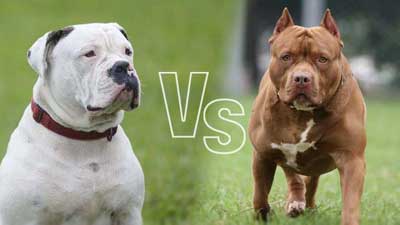- Size
- Smallest
- Small
- Small to Medium
- Medium
- Large
- Giant
- Characteristics
- Smartest
- Hypoallergenic
- Fluffy
- Best Guard
- Best Family
- Best for Kids
- Low Shedding
- Healthiest
- Police Dogs
- Most Calm
- Quietest
- Color
- White
- Black
- Grey
- Brown
- Blue
- Red
- Coat
- Hairless
- Short
- Long
- Origin
- Japan
- China
- Australia
- Germany
- Italy
- United States
- France
- Group
- Hound
- Terrier
- Herding
- Toy
- Working
- Sporting
Unveiling the Real Issues: Dog Aggression Misconceptions

Dog aggression is a concerning behavioral trait often misunderstood and shrouded in misconceptions. Misguided beliefs about certain breeds or perceived triggers often overshadow the complex and diverse nature of aggression in dogs. Let's delve into the misconceptions surrounding dog aggression and uncover the real issues.
1. Misconception: Aggression is Breed-Specific
One of the most prevalent misconceptions is associating aggression with specific breeds. Certain breeds have unfortunately been stigmatized as inherently aggressive, leading to unfair biases and breed-specific legislation. However, aggression in dogs is not exclusive to particular breeds; it's influenced by various factors including upbringing, socialization, training, and individual temperament.
Here are common dog breeds associated with this misconception:
1. Pit Bulls:
Pit Bulls are frequently associated with aggression due to their history in dogfighting. However, this stereotype doesn't reflect the individual temperament of all Pit Bulls. These dogs can be affectionate and friendly with proper training and socialization.
RELATED: 25 Unbiased Facts to Know About Pit Bulls
2. Rottweilers:
Rottweilers are often seen as aggressive due to their protective instincts. They are known for their loyalty and can be gentle and loving companions when raised in a nurturing environment.
3. Doberman Pinschers:
Dobermans have a reputation for being aggressive guard dogs. However, they are highly trainable and thrive on human companionship, often displaying loyalty and affection towards their families.
4. Presa Canarios:
Due to their muscular build, Presa Canarios are sometimes incorrectly perceived as aggressive. However, they can be calm and gentle when raised and trained properly.
5. German Shepherds:
Because of their use in police and military work, German Shepherds are sometimes perceived as aggressive. Yet, they're intelligent, trainable, and often make devoted family pets when properly socialized.
Reality: Aggression is Contextual and Individual
Aggression in dogs stems from a multitude of factors that are unique to each dog. While genetics can play a role, the environment, past experiences, and how a dog is raised significantly impact their behavior. A dog's aggression can be influenced by fear, pain, possessiveness, or defensive instincts, making it crucial to address the underlying causes rather than focusing solely on breed stereotypes.
2. Misconception: Aggression is Always Directly Provoked
Another misconception is that aggressive behavior in dogs is always triggered by explicit provocation or a specific action. However, aggression can be a response to various internal or external stimuli, including fear, stress, anxiety, or even medical conditions.
Reality: Aggression Can Arise from Multiple Triggers
Aggression in dogs can arise from a range of triggers, some of which might not be immediately apparent. Situations such as feeling threatened in their territory, protecting resources like food or toys, or experiencing pain due to an underlying health issue can all contribute to aggressive behavior. Understanding these triggers is essential to effectively manage and modify the behavior.
3. Misconception: Aggression is Incurable or Impossible to Manage
A common belief is that once a dog displays aggressive behavior, it's a permanent trait that cannot be changed or managed effectively. This misconception can lead to a lack of effort in addressing the problem or resorting to drastic measures.
Reality: Aggression Can Be Managed and Modified
While addressing aggression in dogs requires patience, consistency, and professional guidance, it's not a hopeless situation. With proper training, positive reinforcement methods, and behavioral modification techniques, aggressive behavior in dogs can be managed, and in many cases, significantly improved. Seeking help from experienced trainers or behaviorists can provide valuable strategies to modify aggressive tendencies.
Treating Dog Aggression
Treating dog aggression involves a comprehensive approach:
Understanding Triggers: Identify what causes the aggression—fear, possessiveness, or other factors.
Consultation and Planning: Seek advice from vets and behaviorists for a tailored treatment plan.
Behavior Modification: Use techniques like desensitization and positive reinforcement training to encourage calm behavior.
Environment Management: Ensure a safe environment by avoiding triggers and using tools like muzzles when necessary.
Consistency and Patience: Consistent training and patience are crucial for behavior change.
Avoid Punishment: Punishment worsens aggression; focus on positive reinforcement.
Safety First: Prioritize safety for all involved, especially around kids and other pets.
Medication (if needed): Consider medication under professional guidance in severe cases.
Ongoing Support: Regularly monitor progress and seek continued guidance for long-term success.
It's vital to tailor the treatment plan to the individual dog's needs and seek professional help throughout the process.
Conclusion
Understanding the misconceptions surrounding dog aggression is crucial to developing a more informed and empathetic approach. By recognizing that aggression is not solely determined by breed and can be influenced by various factors, we can move towards a more effective and compassionate understanding of managing and modifying aggressive behavior in dogs. It's essential to address the root causes, seek professional guidance, and employ positive reinforcement methods to help dogs overcome aggression and lead happier, healthier lives.
You May Also Like
 Most Powerful DogsThe 10 Most Powerful Dogs In The World
Most Powerful DogsThe 10 Most Powerful Dogs In The World Dog Training Tips5 Things to Know About Puppy Behavior Training Mistakes
Dog Training Tips5 Things to Know About Puppy Behavior Training Mistakes Help & AdviceThese 10 Dog Breeds Novice The Best Not To Keep!
Help & AdviceThese 10 Dog Breeds Novice The Best Not To Keep! Breed ComparisonPresa Canario vs. Cane Corso: Which Is the Better Guard Dog?
Breed ComparisonPresa Canario vs. Cane Corso: Which Is the Better Guard Dog? Breed ComparisonAmerican Bulldog vs. Pit Bull: Which is Stronger?
Breed ComparisonAmerican Bulldog vs. Pit Bull: Which is Stronger? Dog BehaviorDog Biting Behavior: Causes and Prevention
Dog BehaviorDog Biting Behavior: Causes and Prevention